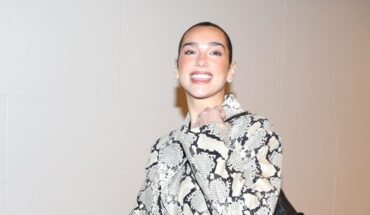
By Stella Manferdini
Published today at 4:07 pm
While waiting to find out who will replace Kim Jones at the head of the women’s line, Fendi has announced that Silvia Venturini Fendi will co-lead the fall-winter 202-2026 collection. During this interval, let us recall the achievements of the rebellious “Fendissime” creator.
Sent to a Swiss boarding school to finish her studies, Silvia Venturini Fendi was only seventeen years old when she left it. “I’m tired of studying,” she announced on her return to Rome. The Fendi sisters – Paola, Anna, Franca, Carla and Alda, daughters of founders Adele Casagrande and Edoardo Fendi – had no doubt about the young rebel’s new role: at work, answering the switchboard, packing packages and collecting sewing pins from weaving workshops with a magnet. But the bad girl of the clan – as fashion critic Dana Thomas nicknamed her in a 1999 editorial – is keen on her career as a young rebel. After completing her studies between Italy and England, she was called upon in 1982 to run the Beverly Hills store on Rodeo Drive. There she met the future father of her two eldest children – Giulio Cesare and Delfina – and planned to move to Rio, Brazil. Rebellious but, by her own admission, not to the end, it is once again her family who brings her back to the right path of the double F.
A path she had already taken, if you look closely, at the age of six, when she appeared in a Fendi commercial, dressed in a beaver bomber jacket and wearing a matching hat. The same one she had spotted and taken over when Karl Lagerfeld, author of this now well-known FF logo, at the helm, where the visual chiasmus (the second F is indeed upside down) stands for Fun Fur. Founded in Rome in 1925 as a company specializing in fine leather goods, Fendi was transformed into a joyful conceptual monogram when the five sisters appointed Kaiser Karl as creative director in 1965: Fun Fur now means “fun, amazing fur”.
Thus, Lagerfeld, on whose knees Silvia Venturini Fendi sat as a child, transformed fur, a bourgeois garment, into a contemporary pictorial canvas, to be colored with fluorescent or pastel shades. This typically Lagerfeldian tendency to shake up the cards of predictability is highlighted by Venturini Fendi, which has been at the helm of the brand’s youth line, Fendissime, since 1987. Subsequently, she took the reins of accessories and the men’s line. She did so without any training in drawing: she learned in the field, from the sketches of Karl Lagerfeld – who, for his part, was a caricaturist by training, a master in the art of illustration. And she does it with excellent instincts.
Skilled at capturing the zeitgeist – the spirit of the times – Silvia Venturini Fendi is the creator of the 1990s it bag, the Baguette, where the anglicism bag (bag) inflates into a loaf of soft fabric. It is an elongated clutch, with a short shoulder strap, dating from 1997, designed to be slipped under the shoulder, like a French baguette. Practical, reassuring and versatile, thousands of variants were made in the years that followed, in exotic leathers, covered with sequin mosaics or embroidered silks, up to the 2023 umbrella bag comparable to a real baguette, with transverse edges and golden crust. In 2009, Venturini Fendi was also responsible for the design of the Peekaboo bag, another it bag from Fendi, whose name – a reference to the peekaboo game I see you – evokes the “I-see-you-I-don’t-see-you” interior compartments, equipped with a system of swivel clasp pockets that force the bag to always remain partially open, while concealing its contents.
Venturini Fendi keeps coming back to her creations: she looks for new treatments of leather, recovers old forgotten techniques, experiments with embroidered linen, fringes, engravings, interchangeable handles, vegetable leathers and “chameleon” leathers, which change color like the animal. At the same time, with the men’s line, she questions gender codes: as a child, she always preferred navy blue to pink, why shouldn’t the opposite be true? So here she is designing men’s pants in transparent nylon and revealing abdominals. As the neopop and neominimal that she is, she applies playful icons to volumes with surgical cuts, introduces the masculine to the pleasure of color, animating geometric silhouettes with fun prints and neon tones.
Like a true time traveller, she mixes the tradition of Italian tailoring with the entertainment of streetstyle. Hostile to perfection, she combines tuxedos with jogging pants, makes shirts in torn faux denim (actually worked leather) or white faux cotton (actually suede), offers pastel suits and trouser skirts, applies imitation crocodile panels (actually neoprene) to biker jackets. “I like my normality with a touch of perversion,” she admits.
When, in 2019, on the death of Karl Lagerfeld, after a fifty-year partnership – the longest collaboration in the history of fashion – Silvia Venturini Fendi took charge of the women’s collection for Fall/Winter 2020-2021, she did so by once again breaking stereotypes. What she had done until now with men, she applies to women, by having more size and mature models parade, in opposition to the diktat of size thirty-eight. She widened the sleeves like inflatable balloons, freed corsets from the anathema of constriction to make them weapons of seduction in the hands of the female army, and applied the boudoir aesthetic all in lace and lingerie to the dresses of the meeting rooms.
A much-loved collection, made by a woman for women – a still rare occurrence, although it shouldn’t be. However, the following season, the direction of Fendi’s women’s collections was entrusted to Kim Jones, who was already in charge of Dior’s men’s line: although he had approached the revenue targets set by the house, Jones did not convince a certain part of the specialized press. The comparison is constant with this unique autumn-winter 2020-2021, the fruit of a woman and a strongly matriarchal culture, dissonant with the ocean of machismo that surrounds us and yet in line with what women would like to wear.
Finally, we come to today: a month ago, the official announcement – which had already been circulating behind the scenes for a long time – of Jones’ departure. And if there is talk of a possible replacement – many are talking about Pierpaolo Piccioli, the outgoing director of Valentino – the first certainty, announced a few days ago, is that the next collection will be co-edited by Silvia Venturini Fendi. The occasion will be the Fall/Winter 2025-2026 show in February, which will also mark the centenary of the house. The second certainty, implicit and unannounced, is that this feminine authority applied to women’s fashion is already good news in itself. And if this creative sceptre is assumed at a critical moment such as that of the transition from one artistic direction to another, the merit is twofold. What can we expect from the collection? Possibly, another lesson in counter-tendencies, from a rebel who has never ceased to be so.
This article was originally published on Harper’s Bazaar Italia on November 12, 2024.





